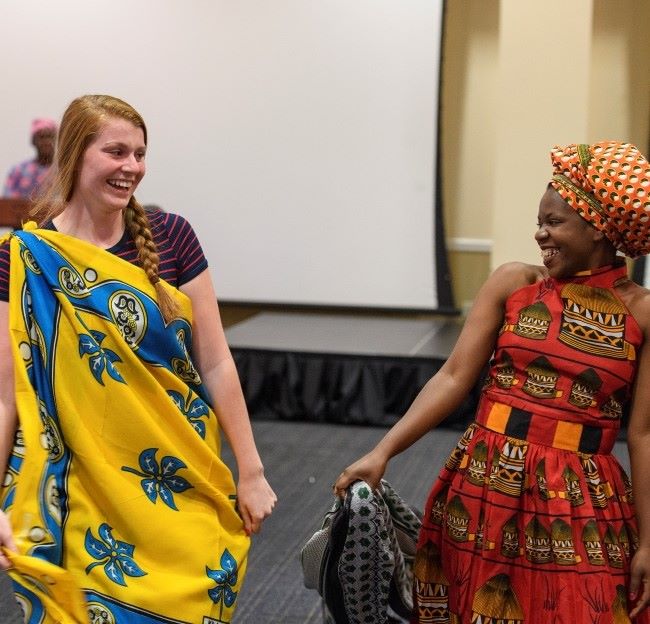Swahili
Study Swahili language and culture to become a global professional.

"As a Foreign Service Officer, I use my language skills and experiences working in cross-cultural spaces to foster genuine relations between the U.S. and Africa region. I am deeply committed to reversing the historic underrepresentation of this region in American foreign policy."
Claire Sullivan (B.A. in International Studies '20)
Foreign Service Officer, US Department of State
Why Study Swahili?
Swahili—or Kiswahili to its speakers—is the most widely-used African language with over 140 million speakers and is considered a lingua franca of the African continent for its everyday use in media, commerce, education, and culture. As a Bantu language, Swahili emerged on the East African coast from a diverse history of trading and cultural exchange between Arabic nations, coastal Africans, and Europeans. Swahili is the official national language of Kenya and Tanzania, and is spoken in Uganda, Rwanda, the Democratic Republic of Congo, Burundi, the Central African Republic, the Comoro Islands, Malawi, east Zaire, southern Somalia, northern Mozambique, Ethiopia, Sudan, and Northern Zambia.
The study of Swahili is increasingly popular among informed, globalized citizens, and Swahili competency enriches studies in Africana studies, archeology, anthropology, international business, history, literature, politics, sociology, governmental work, diplomacy, NGOs, and information technology infrastructure. Indeed, a flourishing online tech-culture scene is emerging in Swahili, known as “Swahilihood.”
African-Americans refer to their annual cultural festival as Kwanzaa, which is derived from the Swahili word kwanza or 'first.'
Our Swahili Program
Department of Modern Languages offers Swahili courses at the beginning, intermediate, and advanced levels to fulfill a Swahili minor or a general education requirement.
The Swahili minor requires the completion of 15 hours of coursework at the 200 level and above. A maximum of 9 credits for the minor may be taken through an approved study abroad program.
Swahili Conversation Group
Join our weekly informal conversation group to practice your Swahili and meet new friends.
— Wednesdays 12:00p-1:00p @ the South Residential College
Beyond the Classroom

Swahili Club
Our Swahili Club offers opportunities to:
• practice spoken Swahili outside of class
• meet and have conversation with native Swahili speakers from Tanzania and Kenya
• learn about culture through activities like cooking, dancing, watching movies, and singing
Swahili Club meets in Bondurant C-016 Mondays 4:00p to 5:00p. On occasion Swahili Club may change location depending on the activity–such as cooking or dancing. Everyone is invited.

Study Abroad
Students who receive a national Boren Scholarship are eligible to participate in the African Flagship Languages Initiative (AFLI) in Tanzania. The host institution is the MS-Training Centre for Development Cooperation based in Northern Tanzania, not far from Mt. Kilimanjaro. The AFLI-Swahili program is an intensive language and cultural immersion program with both US and overseas components.
Swahili Alumna
"Before enrolling at the UM, I came across numerous news articles and political analyses referring to this era as "Africa’s Century." It struck me that while other countries were deepening their engagement with Africa, the United States seemed to be falling behind in its diplomatic efforts. With a natural interest in Africa, I decided to study this region. Initially, I enrolled in French classes because it was the only African regional language offered at the time. However, during my junior year, the university introduced Swahili for the first time. I immediately signed up as I believed it was important for me to learn a language indigenous to the region if I wanted to become an expert in it. Despite being a student who typically struggled with language learning, my amazing professors and fellow students made it easy and enjoyable. After one semester, I fell in love with the Swahili language."
Claire Sullivan (B.A. in International Studies '20)
Foreign Service Officer, US Department of State
